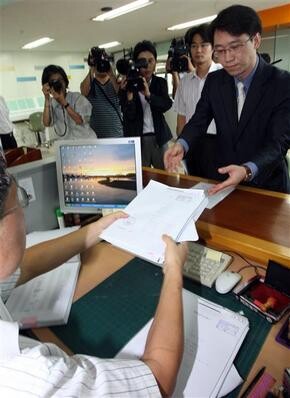hankyoreh
Links to other country sites 다른 나라 사이트 링크
Lee administration’s drive to sack KBS president is illegal, experts say

The Lee Myung-bak administration-led drive to sack KBS President Jung Yun-joo will likely spark legal controversy as it runs directly counter to not only pertinent articles in the Board of Audit and Inspection’s regulations, but also to the intent of revisions to the Broadcast Law. Experts familiar with the the Broadcast Law take the view that since the power to sack the KBS president was eliminated in order to preserve the neutrality and independence of broadcast media, the administration’s move to sack Jung is clearly illegal.
In order to sack Jung, the administration is expected to take a three step process. Based on BAI regulations, the BAI has requested from the KBS board of directors a recommendation to sack Jung. After the board sends its recommendation to President Lee, he will fire the KBS president.
This process, however, runs directly counter to the Broadcast Law, which includes the intent to preserve the terms of the presidents of public broadcast media. The intend behind the legislation of the pertinent articles in the law is clear if one examines the historic travails of the regulation. The Broadcast Law, enacted in the Yusin dictatorship period in December 1972, gave the president the right to name the president of public broadcast media based on a recommendation from the Minister of Culture.
In December 1983, during the Chun Doo-hwan administration, the president was given the power to sack public broadcast media presidents, too, with the enactment of the Basic Law on Government Investment Bodies. In 1987, the Broadcast Communications Law was changed to transfer the power to recommend appointments from a minister to a board of directors, while leaving intact the president’s authority to sack media presidents. In January 2000, with the law being changed into the Comprehensive Broadcast Law, the regulation regarding presidential authority to dismiss public media presidents was removed.
Former Korea Broadcasting Commission President Kang Dae-in, who participated in the enactment of the Comprehensive Broadcast Law, said the elimination of presidential dismissal authority was done so that public broadcast media presidents would be free from the interference or influence of all outside powers, including political power, capital or people power. He said that even giving to the president the authority to appoint media heads was a mere formality, with the real appointment authority given to the recommendation authority -- the board of directors.
Accordingly, if the pro-government board of directors recommend Jung be sacked when the KBS board meets on August 8, fierce controversy is expected over the legal grounds for his dismissal. According to the Broadcast Law, the KBS board of directors only has the authority to recommend the appointment of the KBS president; there are no articles allowing it to recommend or vote for his dismissal.
Lawyer Lee Gi-wook, a member of the KBS board, said the board of directors does not have the power to recommend the KBS president’s dismissal, nor does Cheong Wa Dae have the authority to dismiss him. He said that if the pro-government directors were to vote to recommend Jung’s dismissal, it would clearly be illegal.
Please direct questions or comments to [englishhani@hani.co.kr]
Editorial・opinion
![[Column] Park Geun-hye déjà vu in Yoon Suk-yeol [Column] Park Geun-hye déjà vu in Yoon Suk-yeol](https://flexible.img.hani.co.kr/flexible/normal/500/300/imgdb/original/2024/0424/651713945113788.jpg) [Column] Park Geun-hye déjà vu in Yoon Suk-yeol
[Column] Park Geun-hye déjà vu in Yoon Suk-yeol![[Editorial] New weight of N. Korea’s nuclear threats makes dialogue all the more urgent [Editorial] New weight of N. Korea’s nuclear threats makes dialogue all the more urgent](https://flexible.img.hani.co.kr/flexible/normal/500/300/imgdb/original/2024/0424/7317139454662664.jpg) [Editorial] New weight of N. Korea’s nuclear threats makes dialogue all the more urgent
[Editorial] New weight of N. Korea’s nuclear threats makes dialogue all the more urgent- [Guest essay] The real reason Korea’s new right wants to dub Rhee a founding father
- [Column] ‘Choson’: Is it time we start referring to N. Korea in its own terms?
- [Editorial] Japan’s rewriting of history with Korea has gone too far
- [Column] The president’s questionable capacity for dialogue
- [Column] Are chaebol firms just pizza pies for families to divvy up as they please?
- [Column] Has Korea, too, crossed the Rubicon on China?
- [Correspondent’s column] In Japan’s alliance with US, echoes of its past alliances with UK
- [Editorial] Does Yoon think the Korean public is wrong?
Most viewed articles
- 1[Column] Park Geun-hye déjà vu in Yoon Suk-yeol
- 2Thursday to mark start of resignations by senior doctors amid standoff with government
- 3N. Korean hackers breached 10 defense contractors in South for months, police say
- 4Kim Jong-un expressed ‘satisfaction’ with nuclear counterstrike drill directed at South
- 5[Editorial] New weight of N. Korea’s nuclear threats makes dialogue all the more urgent
- 6Will NewJeans end up collateral damage in internal feud at K-pop juggernaut Hybe?
- 7[Column] ‘Choson’: Is it time we start referring to N. Korea in its own terms?
- 8[Editorial] Japan’s rewriting of history with Korea has gone too far
- 9[Cine feature] A new shift in the Korean film investment and distribution market
- 10[Column] The president’s questionable capacity for dialogue